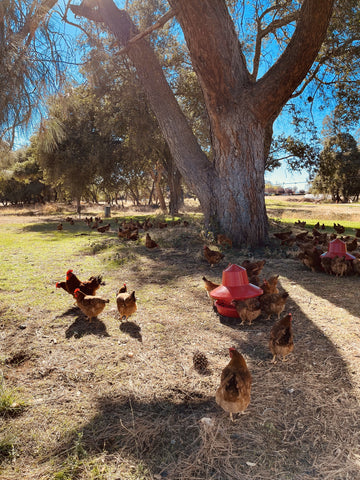
We offer a better alternative to the feed lots and other commercial animal farming methods, which we find inhumane and potentially detrimental to the animals' health and well-being. Corn and soy-based diets, while cheap and readily available, are not necessarily the most suitable choices for many animals. These grains can be hard on their digestive systems, leading to digestive problems and discomfort. By avoiding these feed options, we can promote better animal welfare by opting for more species-appropriate diets. For us, this means that our grazing animals, our cattle and sheep eat fresh grass and occasionally hay during the winter months, and our chickens, turkeys, and pigs receive species-appropriate feed.
When animals are raised in healthier conditions and fed a more natural diet, their overall health improves. This translates into meat that is not only more ethically produced but also more nutritious for you. Meat from animals raised on diverse, pasture-based diets tends to be lower in saturated fats and higher in essential nutrients like omega-3 fatty acids and antioxidants. This makes it a healthier option for those concerned about their diet. We also understand that many of our customers are looking for healthy ways to manage their food allergies. In some instances, corn or soy allergies can be so sensitive that consuming meat that has been fed heavily on these allergens can cause reactions.
The production of corn and soy-based animal feeds has a substantial environmental impact. These crops often require large amounts of pesticides, herbicides, and fertilizers. Moreover, the monoculture farming practices associated with these crops can lead to soil degradation and loss of biodiversity. By avoiding these feed choices, we are upholding our overall promise to encourage more sustainable farming practices that are gentler on the environment.
Animals raised on conventional corn and soy diets are more susceptible to diseases due to the stress placed on their digestive systems. This often leads to the routine use of antibiotics in animal agriculture – which is counter to our promise to you as consumers. By opting for alternative diets that promote better animal health, we can help reduce the need for antibiotics, thus mitigating the risk of antibiotic-resistant bacteria that can affect human health.
We believe that avoiding corn and soy-based animal feed is an important decision that can benefit both our animals, the environment around us, and the people who consume our meats and eggs. Our choice promotes better animal welfare, produces healthier meat, reduces the environmental impact of our farming, and keeps our animals healthier.